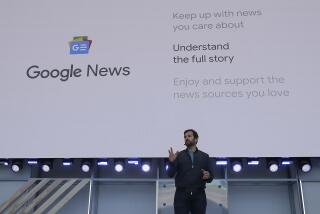Judge rejects Facebook settlement of ‘Sponsored Stories’ lawsuit
- Share via
A federal judge has rejected Facebook Inc.’s proposed legal settlement of allegations that the social networking giant had been unfair and deceptive in using members’ names and photos in its “Sponsored Stories” advertising without their consent.
U.S. District Judge Richard Seeborg in San Francisco said Friday that he had concerns about the proposed settlement. He asked for more information about why the agreement does not award any money to Facebook users.
“In this instance there are sufficient questions regarding the proposed settlement that it would not be appropriate simply to grant the motion and postpone resolution of those issues to final approval,” Seeborg wrote.
He said Facebook and attorneys for the plaintiffs could revise the settlement to address his concerns.
“We continue to believe the settlement is fair, reasonable, and adequate,” a Facebook spokesman said in an emailed statement. “We appreciate the court’s guidance and look forward to addressing the questions raised in the order.”
Five Facebook users filed the lawsuit in May seeking class-action status, alleging that the advertising violates California law because it publicizes products or services that users “like” without paying those users or giving them a way to opt out.
As part of the proposed settlement, Facebook had agreed to give users more control over whether they became unpaid endorsers in ads aimed at their Facebook friends. Facebook also agreed to pay $10 million in legal fees and $10 million to nonprofit organizations specializing in privacy including the Electronic Frontier Foundation.
Facebook has said that Sponsored Stories is one of its most effective forms of advertising on computers and mobile devices. The ads feature the name and photo of a Facebook friend who has clicked that he or she “likes” the advertiser.
It has begun testing expanding the ad feature to let marketers drop more messages into users’ News Feeds. Those messages would target users on their mobile devices and computers even if they have not “liked” the advertiser.
Santa Monica-based Consumer Watchdog opposed the proposed settlement.
Seeborg’s decision “does much to defend the integrity of the class-action process,” John M. Simpson, Consumer Watchdog’s privacy project director, said in an emailed statement. “The way this deal was proposed there was no real benefit for class members.”
ALSO:
Pinterest makes a big mobile play, rolls out Android, iPad apps
German officials reopen inquiry into Facebook facial recognition
Facebook is experimenting with putting more ads in users’ News Feeds
More to Read
Inside the business of entertainment
The Wide Shot brings you news, analysis and insights on everything from streaming wars to production — and what it all means for the future.
You may occasionally receive promotional content from the Los Angeles Times.










